Holy Queen Jadwiga was not afraid to admit that Poles can expect mainly wickedness from the side of the church hierarchy. She said that the activities of the Church seemed absurd. And the cynicism and greed of priests she rebuked the Pope himself.
Jadwiga Andegaweńska was not a figurine, nor a quiet, praying ascetic. She combined piety with ambition. And she was not afraid to point out the mistakes of even the highest ranking people of the Church - as long as they were against her plans and the interests of the kingdom.
She successfully conducted chapter members, parish priests and even bishops. When the Krakow ordinary unexpectedly began to make problems with the reactivation of the local university, she put it against the wall, setting up a house for students not in her capital, but ... in Czech Prague. She showed the bishop that as queen, she had an alternative plan and didn't have to play everything on one card. And that, in turn, the hierarch can have only one university:here in Krakow.
It was not the only time when Jadwiga made others feel her irritation and impatience. When in 1392 one of her trusted chaplains was omitted from the promotion, she started a real row, accusing the cathedral chapter of despising a pious and devoted man to the Church, and at the same time accepting people who were simply unworthy. And, of course, her intervention had the desired effect.
List Ignored
The Harda Queen was also able to stand up to the Pope himself. Her first letter to Urban VI has survived only in the scrapbook. In the epistle, the queen asked the holy father not to believe any libels and slanders spread by the enemies of her marriage to Władysław Jagiełło.
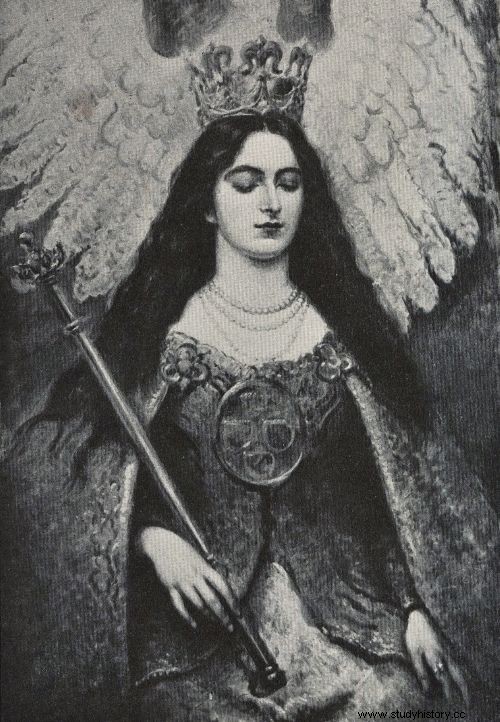
Ethereal, innocent, cut off from the affairs of the temporal world? This is not how we should remember Queen Jadwiga.
It is not known if the letter was ever sent. If so, it must have ended up in the papal rubbish bin. After all, the public vivisection of the queen's most intimate matters lasted for years, and Urban never publicly opposed her (I posted more about this campaign in another article devoted to the most difficult moments in the life of the future saint).
Jadwiga drew the right conclusions. She gave up all illusions and acquired the cynicism necessary in dealing with the ever-greedy and politicized apostolic curia. Her next supplications prove that she not only followed in the footsteps of her grandmother, Elżbieta Łokietkówna , playing a constant, calculated game with the papacy, but even surpassed the master.
Mistress of cynicism
She could sweeten and soap her eyes. She assured the pope that he was "the sun of this world, the sun of justice." She emphasized that only he can "restore the obsolete, supplement the neglected, restore the lost, and bring the fallen back to life." She called him the "absolute sole ruler" whose power was "unrestricted."
It pumped Urban's ego, fed his ambition, and at the same time… made no binding declarations. Because, of course, she remembered to stipulate that all these prerogatives concern only spiritual matters. And that the holy father should not get involved in worldly problems.
In a letter sent around 1389, Jadwiga efficiently combined the assurances of fidelity to Rome (both her own and her ancestors) with a ruthless attack on papal abuses. She called the Roman church "Holy Mother", but was not afraid to admit that instead of support and care from the curia, Poles can expect mainly wickedness .
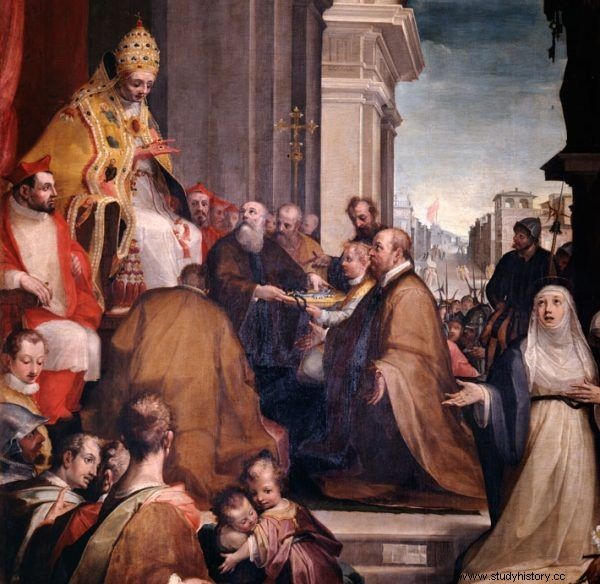
Urban VI in the painting by Allessandro Casolani. The end of the 16th century.
She reminded the Holy Father that his officials inhumanly administered absolute church punishments, excommunications, and interdictions. She considered these measures to be attacks aimed at herself, and the overzealousness of church apparatchiks she called absurd.
She did not directly challenge the authority of the Holy See, but wrote that the actions of the Pope themselves undermined this authority. "Never before had such practices been heard, much less have they been used in Poland," she thundered, stressing that her kingdom was exposed to the mockery and mockery of her enemies through the Pope's fault.
Queen of anti-clericals
The content of the letter should not come as a surprise, because Jadwiga - only about fifteen years old! - Already at that time she deliberately surrounded herself with ... anti-clericals. Its advisers and partners in theological disputes were often priests or even bishops themselves. At the same time, however, they were radical opponents of the papal autocracy, the clerical machine that stood behind the Roman Church, and the cronyism common in the curia, second only to good old corruption.
If something may surprise you, it is the reaction of the curia to the pricks of the Polish queen. Jadwiga was not cursed, no thunders were thrown at her. On the contrary, her position in Rome only grew. When Urban VI was replaced in 1389 by a new pope, Boniface IX, the ratings of Poland itself soared.
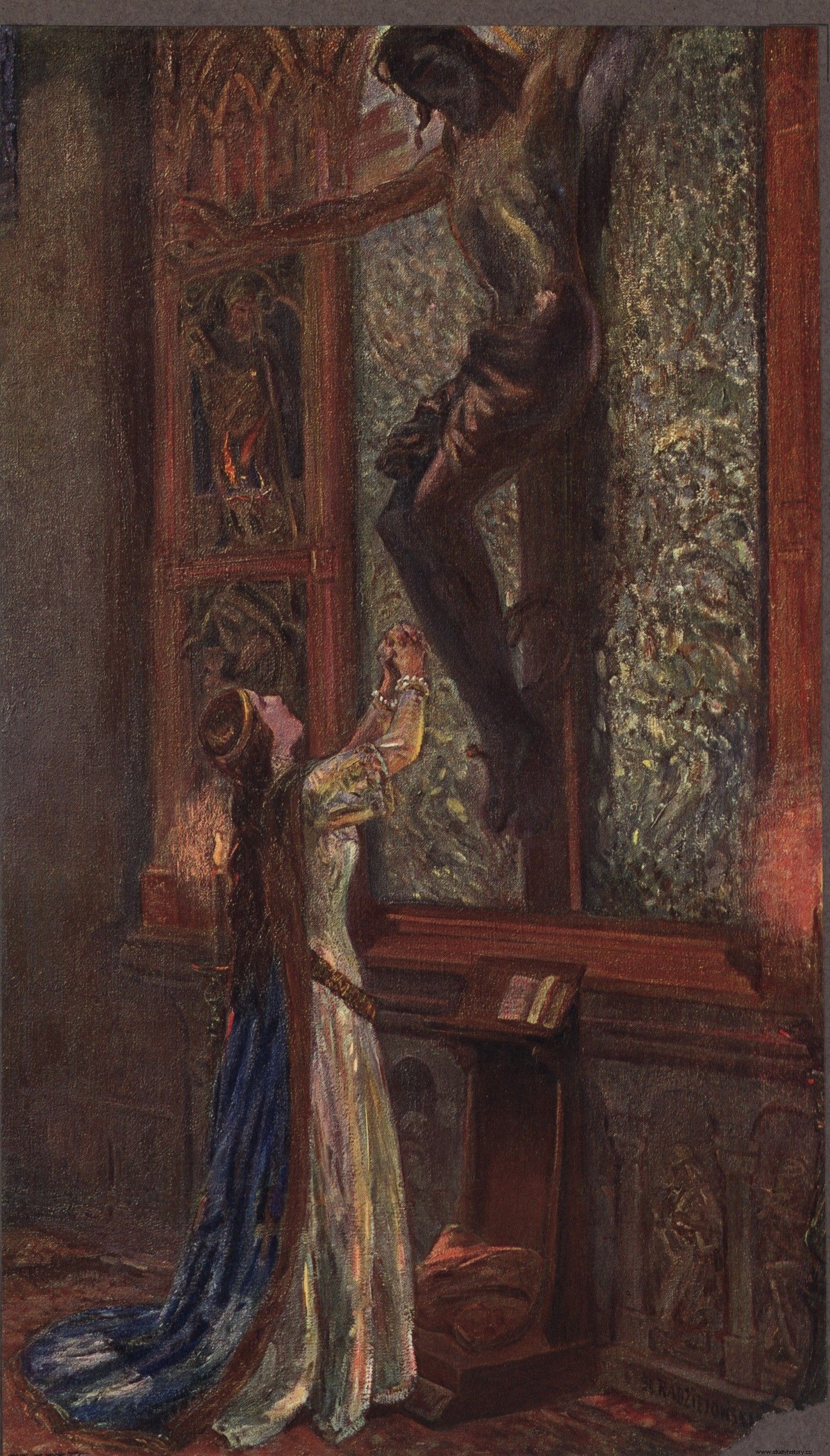
Queen Jadwiga lost in prayers.
Urban considered the Vistula state to be an irrelevant province. Annually, he issued an average of six documents in matters related to Jadwiga's kingdom. A similar number of magazines came out from Boniface's office… monthly. And during his entire pontificate, he issued a total of 875 documents related to the rule of Jagiełło and Jadwiga.
A politicized jubilee
It was not just about the intensity of contacts. The nature of Poland's relations with Rome also underwent a diametrical metamorphosis. When in 1391 Jadwiga sent a new request to the Holy Father, he fulfilled it without batting an eye. It was apparently a completely trivial thing.
From 1300, i.e. from the times before even the coronation of Jadwiga's great-grandfather, Władysław the Short, as king of Poland, ceremonial jubilees were organized on the Tiber. Thousands of pilgrims flocked to the Eternal City to glorify God and get rid of the punishment for sins thanks to the generous indulgences given on this occasion.
The jubilee was a celebration for people of faith, but also for all kinds of Roman businessmen. Silver came along with the pilgrims. Thus, while in the original intention, the said ceremonies were to take place only once every hundred years, in 1343 the interval was shortened to fifty years. As a result, the second jubilee fell ... just in the middle of the Black Death epidemic. Another change took place during Jadwiga's life. The Pope then came to the conclusion that hardly any person would live to be fifty and (supposedly for the good of the faithful, not his own purse) he commanded that henceforth jubilees would be celebrated every thirty-three years. As a result, a great church holiday fell on the year 1390.
It was about him that Jadwiga wrote to Boniface. From the letter we learn that a large group of Polish faithful who wanted to devote themselves to prayers in St. Peter's Basilica set off for Rome. However, they did not manage to reach their destination, falling prey to highwaymen on the way. Shattered and deprived of the funds needed for their further journey, they returned to the country.
Overtime only for Poles
Another ruler would have said that he could not have any influence on organized crime, and that if there were road attacks, it must have been so. But not Jadwiga. She, hearing that everyone can enjoy the jubilee, but not her own subjects, demanded from Boniface that he… organize extra time for Poles only. You might think she was cheeky. Most of all, however, it turned out to be effective. The Pope announced a special indulgence in the kingdom of Jadwiga for most of 1392.
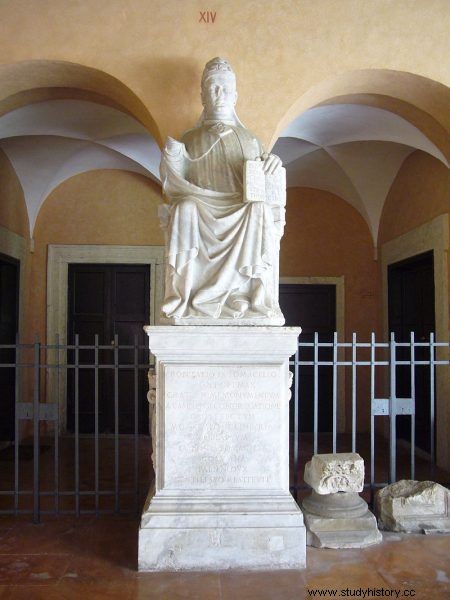
Monument to Pope Boniface IX in the Basilica of St. Paul Outside the Walls.
The success was undoubted - and not only on the religious level. Until recently, Jadwiga had been silently receiving blows from Austrian and Teutonic propagandists who sewed on her the label of a shameless woman, bigamist, and even a prostitute . Now she has deliberately launched a counterattack.
She did not even try to hide that she was accusing the Habsburgs of attacking pilgrims. In a letter to the Pope, she proudly stated that she did not expect Boniface to intervene in this matter and punish the aggressors. The mighty Polish state did not require any assistance, and if the offensive against the treacherous Austrians standing in the way of God's mission did not take place, it was only because Jadwiga's husband was in Lithuania at the time and he could not plead for his subjects.
The Holy Father silently accepted the accusations of the Polish queen. It doesn't matter if he believed in them. All the more so whether the Habsburgs really stood for road robbery. However it was, the image goal was achieved. All of Europe was talking about the wicked man sitting on the throne. And for a change, it was not Jagiełło accused of a false conversion, but the ruler of Austria, Wilhelm Habsburg. A man who really deserved to repay the beautiful for what they are.
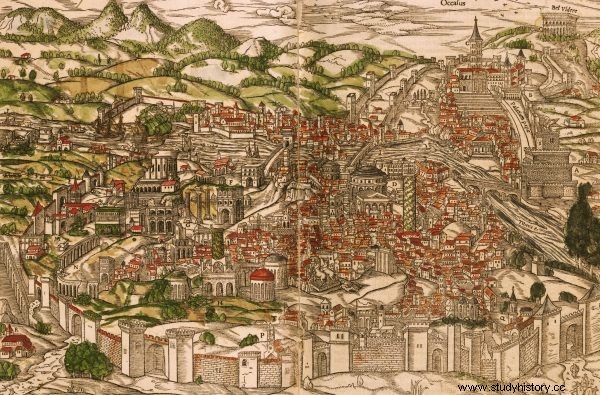
The 16th-century panorama of the eternal city.
The greatest shepherd. And the queen's nominee
Image triumphs were not the only successes of Jadwiga. When Bishop Jan Radlica died, former doctor of Queen Ludwik Węgierski's father and long-term guardian of Jadwiga herself, the monarch spent almost a year in the difficult fight for the right filling of his position. She rejected both the candidacy proposed by the Pope and the man proposed by the chiefs of the Krakow clergy.
She resisted so persistently and with such fervor that the Holy Father finally gave in. Piotr Wysz became the bishop, about whom historians directly write that he was "one of the most outstanding shepherds in the thousand-year history of Krakow".
The queen also ensured an exorbitant promotion to her chancellor Maciej, who became the bishop of Przemyśl thanks to her. And her ambitions were even greater. However, this is a completely different story.
Selected bibliography:
The article was based on materials collected by the author during the work on the book "Ladies of the Polish Empire. The Women Who Built a Power " . Some of these items are shown below. Full bibliography in the book.
- Bubczyk R., Characteristics of the co-government of Jadwiga Andegaweńska and Władysław II Jagiełło in Poland , "Annales Universitatis Mariae Curie-Skłodowska. Sectio F ”, vol. 52–53 (1997/1998).
- Chmielowska B., Foundation privilege of the Queen Jadwiga College at Charles University in Prague [in:] The work of Jadwiga and Jagiełło , comp. W. Biliński, Publishing House of the Archdiocese of Warsaw, Warsaw 1989.
- Górski K., Queen Jadwiga's personality in the context of medieval religiosity , "Polonia Sacra. Theological Quarterly ”, vol. 2, issue 3 (1949).
- Halecki O., Jadwiga Andegaweńska , Universitas, Krakow 2000.
- Krawiec A., Comments on the intellectual and religious horizon of Jadwiga Andegaweńska [in:] From the history of medieval Central and Eastern Europe , part 2, ed. J. Tyszkiewicz, DiG Publishing House, Warsaw 2007.
- Kwaśnicka M., Did the spirituality of St. Jadwiga may be up to date today? [in:] In the footsteps of Saint Queen Jadwiga and her era , ed. T. Graff, Parish pw. st. Jadwigi Królowej, Krakow 2013.
- Kwaśnicka M., Jadwiga , Saint Nicholas Foundation / Redaction of "Teologia Polityczna", Warsaw 2015.
- Not in the light of the stones, but in humility and meekness ...:around the spirituality of St. Jadwiga Królowej:materials from the scientific session organized by the Pontifical Academy of Theology in Krakow on the occasion of the tenth anniversary of the canonization of St. Queen Jadwiga and the 750th anniversary of the foundation of the city of Krakow (6 June 2007) , ed. K. Panuś, Scientific Publishers of the Pontifical Academy of Theology, Krakow 2007.
- Nikodem J., Jadwiga, King of Poland , Ossolineum, Wrocław 2009.
- Ożóg K., The Catholic Church in the Polish kingdom in the times of Władysław Jagiełło , "Scientific Journals of the Jagiellonian University. Historyczne works ”, vol. 141, issue 2 (2014).
- Ożóg K., Influence of St. Jadwiga Król to Christianity in Poland , "Zeszyty Radomszczańskie", vol. 3 (2009).
- Przybyszewski B., Saint Jadwiga, the queen adorned with virtues , Wydawnictwo Św. Stanisław BM of the Archdiocese of Krakow, Krakow 1997.
- Ryś G., Jadwiga against the pope's authority in the Church in the time of crisis and schism [in:] In the footsteps of Saint Queen Jadwiga and her era , ed. T. Graff, Parish pw. st. Jadwigi Królowej, Krakow 2013.
- Sroka S.A., Królowa Jadwiga , WAM, Krakow 2002.
- Wyrozumski J., Królowa Jadwiga. Between the Piast and Jagiellonian eras , Universitas, Krakow 2006.
